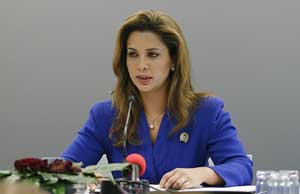
FEI creates anti-drug Unit
The International Equestrian Federation has been advised to create an independent investigation unit to help clean up lingering drug problems in the sport.
The FEI should also review its drug-testing protocols, improve stable security at international events and be more professional by creating paid roles for officials, according to a report published on last Wednesday.
A confidential hot line could be created for riders and vets to check the dangers of using certain medications. Confusion has arisen because some drugs permitted for use on horses in training are classed as doping products at competitions.
FEI president Princess Haya of Jordan, who has campaigned to clean up the sport and improve horse welfare after a series of drug scandals at the past two Olympics, said the organization had to turn over a new leaf.
The Stevens report and a separate review of equestrian sports' drug-testing policies “both painted a picture that illustrates how negligent we have been in this area thus far, and our governing body is completely committed to rectifying the problems we now face,” she said in a statement.
A new integrity unit, which would be outsourced and report to the FEI's ruling bureau, topped the list of Stevens' recommendations.
“It aims to enable the FEI to be better positioned to control events, identify offenders, and monitor corruption and conflicts of interest,” the report said.
Integrity officials would attend competitions, while other proposals include using surveillance cameras in stables at championships and top-tier events, stewards to oversee veterinarians' work and monitoring the activity of grooms more closely.
“We think there is a need for a more sophisticated and effective stable security,” Stevens said.
He also urged that “a clear line should be established between trace amounts and performance enhancing (doping) levels.”
The four-man Stevens commission included David O'Connor, the 2000 Sydney Olympics gold medalist in eventing and president of the United States federation, FEI Tribunal chairman Ken Lalo, and John Roche, the governing body's director of jumping.
Its report will be combined with research by the FEI's Clean Sport review led by IOC Medical Commission chairman Arne Ljungqvist. It was created after six horses failed drug tests at the Beijing Games.
Their combined proposals will be presented to the FEI's 134 national federations at its annual assembly scheduled Nov. 15-20 at Copenhagen.
